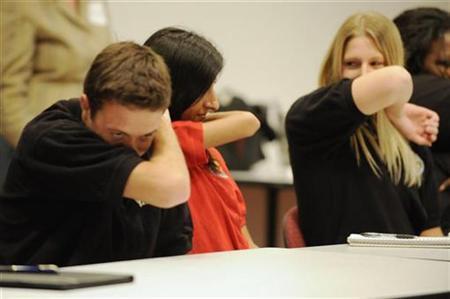
Newswise — The flu virus is a ‘gift’ that you don’t want to keep on giving throughout the holiday season, warns Dr. Thomas Cavalieri, dean of the UMDNJ-School of Osteopathic Medicine, and the best way to avoid the flu is prevention with a seasonal flu vaccine.
“The flu virus is can easily hitch a ride on a handshake, hug or kiss,” Dr. Cavalieri said. “Feeling fine is not always an indication, because you can be contagious with the virus for a couple of days before you notice any symptoms. If you get a flu vaccine now, you will limit the chance that you’ll be passing on or receiving the virus when celebrating with family or friends this holiday season.”
The U.S. Centers for Disease Control and Prevention (CDC) recommend that everyone older than 6 months be vaccinated this year, but as of mid-November only about one-third of those eligible have gotten the vaccine.
“It is important not to underestimate the danger of influenza,” Dr. Cavalieri added. “In the mildest years we’ve seen, the flu still caused about 3,000 deaths. during our worst flu seasons, that number has ballooned to as many as 49,000. The CDC estimates that last year, the H1N1 virus alone killed more than 12,000 people in this country.”
Cavalieri noted that the HIN1 virus is expected to circulate in the United States again this flu season, and that it is one of three strains of flu virus included in this year’s vaccination. Although the flu season is only beginning to take hold in several parts of the country, the holiday season typically will kick off a wave of infections.
People who don’t get a flu vaccine are not just putting themselves at risk. “If you don’t get a flu vaccine, you put at risk everyone you come in contact with, including very young children or the elderly, two groups who are most at risk from serious complications from the virus,” said Dr. Cavalieri.
It takes about two weeks after getting the vaccine for your body to manufacture enough antibodies to provide full protection from the seasonal flu. for those who are not able to get a vaccine immediately, Dr. Cavalieri offers these tips to help keep you and those around you out of the flu virus’s path.
• Take care of yourself. get plenty of rest, drink lots of fluids and eat a balanced diet. your risk of illness increases when you get run down.• Wash your hands. Lather soap on hands and between fingers for 20-30 seconds before rinsing. Wash your hands often during the day, especially after being out in public places like malls. Teach young children to sing a song while washing. The “ABC” song or two verses of “Happy Birthday” should take about 20 seconds to sing. • Keep tissues handy. have tissues available wherever you go and dispose of used tissues immediately. Encourage children to avoid spreading germs by sneezing into their elbows or shoulders if tissues aren’t available. • Avoid those who are sick. If you know that someone at a friend or relative’s house has been ill with the flu, postpone your visit for a few days. try to keep about five or six feet away from anyone who is coughing or sneezing. • Keep your hands away from your face. Touching your eyes, nose or mouth could allow you to become infected by viruses on your hands.• Finally, stay home if you are sick. everyone has “important” work to do, but going back to work or school before you have fully recovered will increase the risk of your spreading illness to fellow workers and students.
The UMDNJ-School of Osteopathic Medicine (som.umdnj.edu) is dedicated to providing excellence in medical education, research and health care for new Jersey and the nation. Working in cooperation with Kennedy University Hospital, its principal affiliate, the UMDNJ-School of Osteopathic Medicine places an emphasis on primary health care and community health services that reflect its osteopathic philosophy, with centers of excellence that demonstrate its commitment to developing clinically skillful, compassionate and culturally competent physicians from diverse backgrounds, who are prepared to become leaders in their communities.
The University of Medicine and Dentistry of new Jersey (UMDNJ) is the nation’s largest free-standing public health sciences university with nearly 5,700 students attending the state’s three medical schools, its only dental school, a graduate school of biomedical sciences, a school of health related professions, a school of nursing and its only school of public health on five campuses. Annually, there are more than two million patient visits at UMDNJ facilities and faculty practices at campuses in Newark, new Brunswick/Piscataway, Scotch Plains, Camden and Stratford. UMDNJ operates University Hospital, a Level I Trauma Center in Newark, and University Behavioral HealthCare, a statewide mental health and addiction services network.
Comment/Share